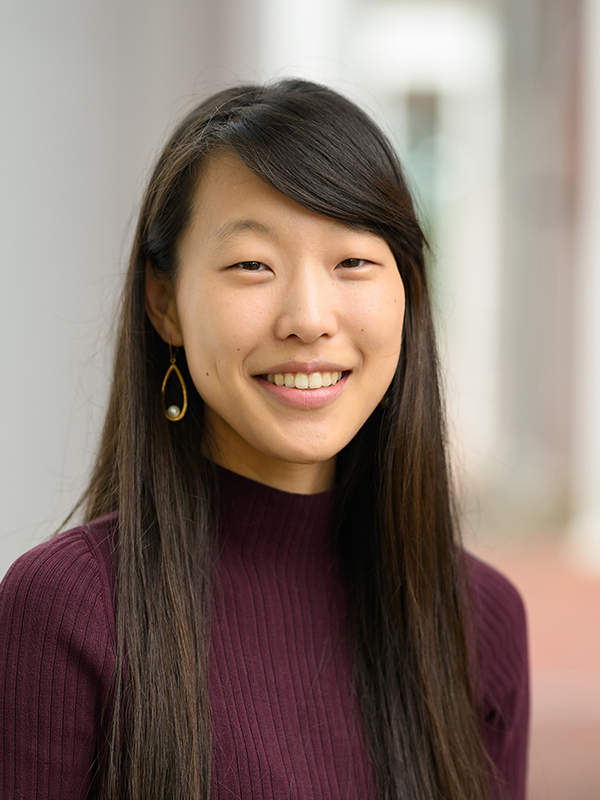Sarah Kim
Education
- Postdoctoral Associate in Biomedical Engineering, Duke University Nov 2019-Present Advisor: Ashutosh Chilkoti, Ph.D.
- Ph.D. in Molecular Biophysics, Johns Hopkins University Aug 2013-Oct 2019 Thesis Title: “Discovery and Characterization of pH-Sensitive, Membrane Active Peptides” Advisor: Kalina Hristova, Ph. D.
- B.A. in Chemistry and Biology (Magna Cum Laude), Cornell University Aug 2009-May 2013 Thesis Title: “A Steady-State Fluorescence Spectrometry Method for Quantifying Partitioning Between Lo and Ld Phases in Multi-Lamellar Vesicles” Advisor: Gerald Feigenson, Ph.D.
Research
- Drug delivery, biomaterials, membrane biophysics, synthetic biology, elastin-like polypeptides, membrane active peptides, high-throughput screens, green chemistry.
Teaching
Bard College, Annandale-on-Hudson, NY
- Faculty, Citizen Science Program July 2022-January 2023
Duke University, Durham, NC
- Participant, Teaching Writing in the Disciplines Certificate Program Fall 2022-Spring 2023
- Fellow, Preparing Future Faculty Program. Fall 2021-Spring 2022
Johns Hopkins University, Maryland, MD
- Guest Instructor, Biomaterials Lab. Instructor: K. Hristova Spring 2015, 2016, 2017, 2018, 2019
- Guest Instructor, Intro to Biophysical Methods, Instructor: Elmer A. Zapata-Mercado Fall 2018
- Participant, Preparing Future Faculty Certificate Program 2016-2018
- Instructor, Life-A Matter of Fat. Hopkins Engineering Applications & Research Tutorials Fall 2017
- Fellow, Collaborative Teaching Fellows Program 2016
- Guest Lecturer, Biomolecular Materials I. Instructor: K. Hristova Fall 2015 and 2016
- Teaching Assistant, Proteins and Nucleic Acids. Instructors: G. Bowman and S. Woodson Fall 2014
Baltimore Under Ground Science Space (BUGSS)
- Instructor, Molecular Biology Bootcamp: Building a Kill-Switch in Bacteria. Nov 2016
Students Mentored
- Matthew Wang, Chilkoti Lab, undergraduate researcher, Duke University Sept 2022-May 2023
- Jocoa Kerschen, Chilkoti Lab, Amgen Scholar, Duke University Summer 2022
- Taylor Devlin, Hristova Lab, rotation student, Johns Hopkins University Spring 2019
- Sijia Li, Hristova Lab, undergraduate researcher, Johns Hopkins University 2014-2017
- Elmer Zapata Mercado, Hristova Lab, rotation student, Johns Hopkins University Spring 2016
- Prathik Naidu, Ulmschneider Lab, high school student, Johns Hopkins University Summer 2015
- Dakota He, Hristova Lab, high school student, Johns Hopkins University 2014-2015
Selected Publications
- Wiedman, G., Kim, S.Y., Zapata-Mercado, E., Wimley, W.C. and Hristova, K., 2017. pH-triggered, macromolecule-sized poration of lipid bilayers by synthetically evolved peptides. J. Am. Chem. Soc., 139(2), pp.937-945.
- Li, S., Kim, S.Y., Pittman, A.E., King, G.M., Wimley, W.C. and Hristova, K., 2018. Potent Macromoleculesized poration of lipid bilayers by the macrolittins, a synthetically evolved family of pore-forming peptides. J. Am. Chem. Soc., 140(20), pp.6441-6447.
- Kim, S.Y., Pittman, A.E., Zapata-Mercado, E., King, G.M., Hristova, K., and Wimley, W.C., 2019. Mechanism of action of peptides that cause pH-triggered macromolecular poration of lipid bilayers. J. Am. Chem. Soc., 141 (16), pp 6706–6718.
- Paredes, S.D., Kim, S., Rooney, M.T., Greenwood, A.I., Hristova, K. and Cotten, M.L., 2020. Enhancing the membrane activity of Piscidin 1 through peptide metallation and the presence of oxidized lipid species: Implications for the unification of host defense mechanisms at lipid membranes. Biochim. Biophys. Acta- Biomembranes, 1862(7), p.183236.
- Kim, S.Y., Bondar, A.N., Wimley, W.C. and Hristova, K., 2021. pH-triggered pore-forming peptides with strong composition-dependent membrane selectivity. Biophys. J., 120(4), pp.618-630.
- Guha, S., Ferrie, R.P., Ghimire, J., Ventura, C.R., Wu, E., Sun, L., Kim, S.Y., Wiedman, G.R., Hristova, K. and Wimley, W.C., 2021. Applications and evolution of melittin, the quintessential membrane active peptide. Biochem. Pharmacol., 193, p.114769.
- Kelly, G., Milligan, J.J., Mastria, E.M., Kim, S., Zelenetz, S.R., Dobbins, J., Cai, L.Y., Li, X., Nair, Kim, S.Y. and Chilkoti, A., 2022. Intratumoral delivery of brachytherapy and immunotherapy by a thermally triggered polypeptide depot. J. Controlled Release, 343, pp.267-276.
- Saha, S. Banskota, S., Liu, J., Zakharov, N., Dzuricky, M., Li, X., Fan, P., Deshpande, S., Spasojevic, I., Sharma, K., Borgnia, M., Schaal, J.L., Raman, A., Kim, S.Y., Bhattacharyya, J., Chilkoti, A., 2022.
- Genetically Engineered Nanoparticles of Asymmetric Triblock Polypeptide with a Platinum(IV) Cargo Outperforms a Platinum(II) Analog and Free Drug in a Murine Cancer Model. Nano Lett.
Research Grants
Completed Grants
- Duke-Coulter Translational Partnership 9/1/2021-8/31/2022
- Title: “Development of a genetically-engineered injectable drug depot of panobinostat for the treatment of highgrade pediatric brain tumors through convection enhanced delivery (CED)”
- PIs: David Ashley, Ph.D.; Soumen Saha, Ph.D. Duke University
- Role: I helped write and revise the grant, as well as develop and test drug formulations.
Pending Grants
- Future Manufacturing National Science Foundation Grant submitted May 2022
- Title: “FMRG: Bio: Scalable Continuous Manufacturing of Viral Vectors”
- PIs: Ashutosh Chilkoti, Ph.D., Charles A. Gersbach, Ph.D., Micelle Sabaoun, MS, Aravind Asokan, Ph.D. Duke University and Alamance Community College
- Role: Co-author.
Honors and Awards
- 3 Minute Thesis Competition, Finalist April 2019
- Women in STEM Symposium, 1st Place Graduate Student Poster Award April 2019
- 2018 JHU Nano-Bio Symposium: Advanced Manufacturing, 3rd in People’s Choice Poster Presentation Award May 2018
- 2017 JHU Nano-Bio Symposium: Engineering Vascularization, 2nd in Poster Competition May 2017
- Biophysical Society Student Research Achievement Award, Poster Competition Feb 2017
- Biophysical Society Student Research Achievement Award, Poster Competition Feb 2016
- Carlson Fellowship, Thomas C. Jenkins Department of Biophysics 2013-2015
